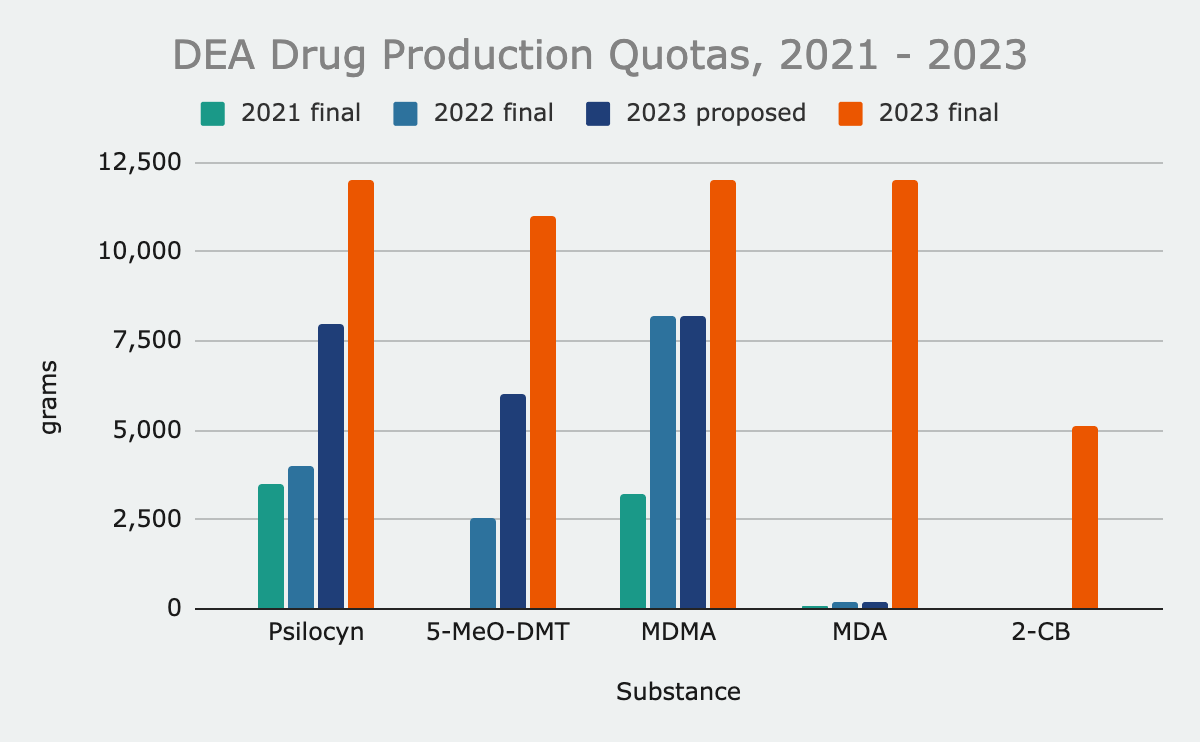DEA Increases Psychedelic Quota; Berkley CA to Decrim LSD?; CO Governor to Appoint Advisory Panel
The news from psychedelia is starting to trickle (thank god!) as we head into year’s end and approach 2023, a pivotal year for psychedelic policy and drug development.
In light of the dry news cycle, I spent most of the week working on a piece I hoped to publish today about the impact of metabolic health on mental illness. It is based on the new book by Harvard psychiatrist Chris Palmer titled Brain Energy.
It’s an exciting idea that has many parallels to the psychedelic movement.
I even coined a pithy phrase to capture the evolution of the BioPsychoSocial Model of disease: The PsychoSpiritualMetabolic model.
Remember, you heard it hear first.
That piece will be out next week if I can pull it together.
As for today, we’ve got a few developments worth mentioning, including:
DEA Confirms Psychedelic Production Quotas for 2023
Berkeley’s Health Commissioners Recommend Psychedelic Decriminalization
Colorado Governor To Appoint Psychedelics Advisory Panel
Let’s get on with it.
Berkeley Health Commissioners Recommend Decriminalizing LSD
Berkeley, California, is the latest US City to announce plans for decriminalizing psychedelics.
But unlike the handful of other municipalities that have adopted the Decriminalize Nature platform that includes the naturally occurring psychedelic plants and fungi, Berkley plans to include LSD in its provision. Perhaps a nod to the influential role of the compound in the city’s history.
From NBC Bay Area:
“Berkeley is one step closer to legalizing LSD after city health commissioners voted unanimously to recommend to the city council decriminalize the use of hallucinogens.
If the city council approves the proposal, Berkeley will become the first city in the country to have such an ordinance.
That same measure includes decriminalizing the use of natural psychedelics like mushrooms - which 15 cities across the U.S. have now done - including neighboring Oakland and San Francisco.
But no city has loosened restrictions for synthetic drugs like LSD.”
Decriminalize Nature wrote the initial framework, but city commissioners rewrote it to include LSD and prohibit sharing, gifting, or exchange. As a result, the proposal is now opposed to Decriminalize Nature.
From Berkleyside:
“Berkeley’s resolution was initially drafted by the Oakland-based nonprofit Decriminalize Nature in 2019, and proposed decriminalizing only natural psychedelics, such as psilocybin mushrooms, ayahuasca, and mescaline cacti. The resolution spent two years in the hands of the city’s Community Health Commission (CHC), one of 22 civil commissions advising the City Council. Over the last year, Adams and Smart, the two commissioners appointed to study it, entirely rewrote it. If approved by the City Council, the personal consumption of psychedelics will cease to be criminalized in Berkeley; sharing, giving, or distributing psychedelics will, however, continue to be crimes…
Because of these changes, Decriminalize Nature now opposes the project and expects that, if the project reaches the City Council, the original version will be discussed.”
On Tuesday, the Berkeley community Health Council will decide if the proposal will move to the City Council for a vote.
DEA Increases Production Quota for Psychedelics
The DEA announced the final 2023 production quotas for scheduled substances to be used in research. Notably, the agency significantly increased the allowed amounts of several psychedelics from previously expected numbers they announced in October.
Initially, the agency had proposed to allow 8,200 grams of MDMA, which was revised to 12,000.
Psilocin production was initially capped at 8,000 grams but will now be 12,000 grams.
The allowed allotment of 5-Meo-DMT doubled from the expected 6,000 grams to 11,000 grams.
These reconsiderations followed a public comment period in which researchers and drug developers weighed in to lobby for more production capacity citing the increasing research and development projects.
This graph from Marijuana Moment shows the final production quotas compared to the last three years.
Notably, production quotas for psilocybin, LSD, DMT, and mescaline have not changed from October’s original suggestion or last year’s production quota.
Again, a helpful graph from Marijuana Moment:
Colorado Governor To Appoint Psychedelics Advisory Panel
Last month, Colorado voters approved the Natural Medicine Health Act, which decriminalized the possession, consumption, and non-monetary exchange of several psychedelic substances and developed a legalized framework for the commercial sale and facilitation of psilocybin in licensed healing centers.
“The first step on the itinerary is developing an advisory board, which will include appointees from Gov. Jared Polis tasked with helping the Department of Regulatory Agencies implement the new program…After appointees are named, the board will kick off an 18-month rulemaking process to develop regulations around facilitator licensing, training and the operation of healing centers…”
The article notes a projected launch of summer 2025 for the legal healing centers. Meanwhile, the decriminalization component of the ballot initiative went into effect immediately.
That’s all for this week; thanks for reading!
Zach




